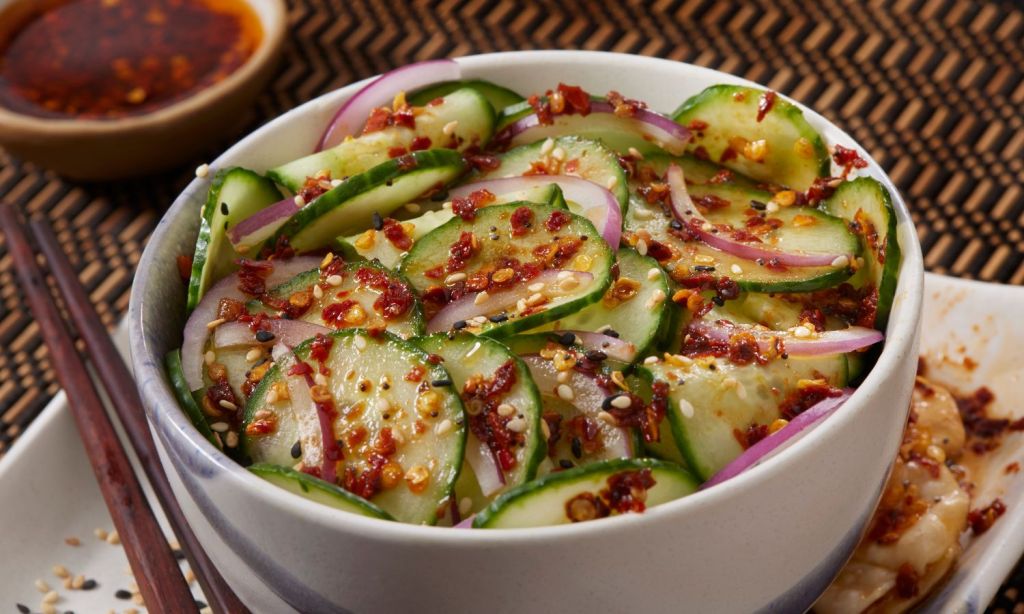When was MSG banned in Australia? What does MSG do to the human body? How does MSG affect the brain? They’re some of the “People also ask” questions when I search ‘MSG’ in Google.
They’re similar to the questions I had when TikToker Logan (@logagm) mentioned MSG as an ingredient in his many viral “Sometimes you need to eat an entire cucumber” recipes.
MSG, short for monosodium glutamate, is a flavour enhancer often added to restaurant foods and canned soups and veggies. It was invented by a Japanese chemist in the early 1900s but is also found naturally in foods like grapes, tomatoes, mushrooms and certain cheeses including Parmesan and Roquefort. MSG is even in breast milk.
Why Does MSG Have a Bad Reputation?
“There seems to be a perception that MSG is an artificially created chemical that isn’t found in nature,” says Dennis Oh, owner of Sydney restaurant Sil Bi Jip. “MSG is naturally occurring in many vegetables. With the right amount, it can help express a much wider variety of flavours in your cooking.”
The MSG panic is said to have started in the 1960s when doctors began sharing varying symptoms after eating certain foods, eventually dubbed ‘Chinese Restaurant Syndrome’ by The New England Journal of Medicine. MSG was isolated at the ingredient causing the ill-ease and word spread.
“It was a very flimsy article by today’s standards,” says Corey Costello, chef at Sydney eatery 20 Chapel. “Some say it was a satire piece but for whatever reason the public and media latched onto it.”
For decades following the piece, MSG was demonised in popular media, further entrenching the belief it was an unhealthy additive, says Joanne Lee, executive chef of Sydney’s Arisun and Butchers Buffet. This led to MSG-free labels on food products which created the idea the ingredient was something to be avoided, similar to trans fats.
“The term ‘Chinese Restaurant Syndrome’ also spread racial bias, unfairly linking MSG to Asian food, especially Chinese dishes,” Lee says. “This didn’t just give MSG a bad name but also fuelled negative attitudes towards Asian food in general.”
So What Does Science Say?
So what’s the science behind MSG and its effect on us? Science History Institute writes: “[…] the vast majority of evidence suggests that MSG causes no harm. […] the idea that MSG poisons people violates common sense. […] People in East Asian countries consume 1,700 milligrams of MSG per day on average. But no one there gets sick from MSG.”
The Federation of American Societies for Experimental Biology (FASEB) investigated the safety of the ingredient in the 1990s, reports Harvard Health Publishing. They noted that any ill effects were mild and short-lived and were typically associated with large doses (more than 3 grams) of MSG consumed without food. It also found that less than 1% of the general population was sensitive to MSG.
“Eaten in small amounts and as part of a meal, MSG likely won’t have a negative effect, so long as you’re not one of the small subset of people who are sensitive to it,” writes Harvard Health. “But since it’s often used in conjunction with other, less-healthy or highly processed ingredients, you may want to limit your consumption of it […].”
Costelloe says part of MSG getting a bad rap is that people tend to overeat foods heavy with it, like fried rice with soy sauce or spaghetti Bolognese with Parmesan. “After you eat such a large amount of food, you tend to feel rubbish and usually have a terrible sleep,” he says. “People then blame the MSG when the reality is it’s the overeating and your body processing all that food.”
Why Do Chefs Use MSG?
Lee says MSG can reduce the need for excess salt, boost overall taste and balance flavours. Sam Ng, head chef at Sydney’s Taphouse, adds that MSG produces a lot of umami, considered the fifth flavour profile, joining sweet, salty, sour and bitter. It’s long been used in Asian cuisine but has recently gained popularity in Western cuisine.
“It’s a lifesaver for smaller restaurants because it can recreate the rich, umami flavour of time-consuming stocks or labour-intensive processes,” says Ng. “In larger restaurants with more resources, traditional methods can be used instead. If a recipe benefits from MSG and it can boost its flavour, there’s definitely a time and place for it.”
He thinks people should dig deeper before jumping on the ‘MSG is bad’ bandwagon. He says it’s often unfairly associated with lower-quality food, particularly in relation to certain cuisines.
“I think it’s important for people to look beyond these stereotypes,” Ng says. “With some research, we can appreciate MSG as just another ingredient — one that enhances flavour and can be enjoyed in moderation rather than labelling it as inherently unhealthy.”
Related: The Upside to Sydney and Melbourne’s Dining Scene Rivalry
Related: Tastemakers: Jad Nehmetallah Says Western Sydney’s Dining Scene Is a Sleeping Giant
Read more stories from The Latch and subscribe to our email newsletter.

